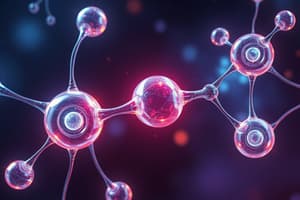Podcast
Questions and Answers
What role does the shape of molecules play in their function?
What role does the shape of molecules play in their function?
- Shape determines the ability to connect with receptors and ligands. (correct)
- Shape does not influence molecular interactions.
- Shape is solely responsible for the molecular weight.
- Shape has no relevance to biological processes.
Which of the following correctly describes water's molecular polarity?
Which of the following correctly describes water's molecular polarity?
- Hydrogen atoms have a positive charge and oxygen has a negative charge. (correct)
- Oxygen carries a positive charge while hydrogen carries a negative charge.
- Water's polarity results from equal sharing of electrons.
- Water is a non-polar molecule with equal charges.
How do acids and bases affect the pH scale?
How do acids and bases affect the pH scale?
- Acids donate hydrogen ions while bases accept them. (correct)
- Only acids influence the pH scale significantly.
- Acids accept hydrogen ions while bases donate them.
- Both acids and bases raise the pH level.
What distinguishes organic molecules from inorganic molecules?
What distinguishes organic molecules from inorganic molecules?
Which of the following statements about carbohydrates is true?
Which of the following statements about carbohydrates is true?
Which functional group is commonly found in amino acids?
Which functional group is commonly found in amino acids?
What is a characteristic property of hydrophilic molecules?
What is a characteristic property of hydrophilic molecules?
Which of the following is NOT an example of a macromolecule?
Which of the following is NOT an example of a macromolecule?
Flashcards are hidden until you start studying
Study Notes
Molecular Shape and Function
- Molecules have specific shapes and functions.
- Shape determines how molecules interact.
- Receptors and ligands bind based on shape.
- Antibodies neutralize antigens by binding to their specific shapes.
Water
- Water is a polar molecule with a V-shape.
- This polarity is due to oxygen's electronegativity and the attraction between hydrogen and oxygen atoms.
- Water molecules form hydrogen bonds with each other.
- Water is a good solvent, dissolving substances like sugar and salt.
- Aqueous solutions use water as the solvent.
- Hydrophilic molecules attract water.
- Hydrophobic molecules repel water.
Importance of Hydrogen Compounds
- The concentration of Hydrogen ions (H+) in a solution determines its pH.
- Acids donate protons (H+).
- Bases accept protons (H+).
- The pH scale ranges from 0 to 14, with 7 being neutral.
- Values below 7 are acidic, and values above 7 are alkaline.
Biological Molecules
- Organic molecules contain carbon.
- Each organic molecule has a unique shape that dictates its function in an organism.
- The properties of an organic compound depend on its carbon skeleton and the attached functional groups.
Functional Groups
- These groups of atoms attach to carbon skeletons.
- Hydroxyl groups (-OH) are found in alcohols and sugars.
- Carbonyl groups (C=O) are found in sugars.
- Amino groups (-NH2) are found in amino acids and urea.
- Carboxyl groups (-COOH) are found in amino acids, fatty acids, and vitamins.
Giant Molecules from Smaller Building Blocks
- Macromolecules are large molecules vital in biological systems.
- Examples include DNA and carbohydrates.
Biological Macromolecules
- Carbohydrates store energy and provide structural support.
- Simple sugars like glucose and fructose are found in soft drinks and fruits.
- Complex carbohydrates like starch are found in pasta and potatoes.
- Monosaccharides are the main energy source for cells.
- Glucose is found in sports drinks.
- Fructose is found in fruits.
- Honey contains both glucose and fructose.
Studying That Suits You
Use AI to generate personalized quizzes and flashcards to suit your learning preferences.




